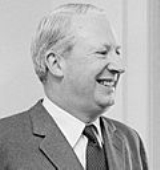
, MBE
, PC
(9 July 1916 – 17 July 2005) was a British Conservative
politician who served as Prime Minister of the United Kingdom
(1970–74) and as Leader of the Conservative Party
(1965–75).
Born in Broadstairs
, Kent
, Heath studied at Oxford
and served in the Second World War. He was first elected in the 1950 general election, for Bexley
and was government Chief Whip during the 1950s. Entering the Cabinet as Minister of Labour in 1959, he was then Lord Privy Seal
responsible for Macmillan's unsuccessful EEC entry negotiations, then President of the Board of Trade.
Action, not words.![]()
Robin Day: How low does your personal popularity have to go before you consider yourself a liability to the party you lead?Edward Heath: Popularity isn't everything.![]()
I have always had a hidden wish, a frustrated desire, to run a hotel.![]()
This would, at a stroke, reduce the rise in prices, increase production and reduce unemployment.![]()
It was wildly exciting. It certainly wasn't the highest feeling I've ever had, but it was one of them. In those days, security was not as good as today. Just afterwards, some chap was able to get at me and stab the back of my neck with a cigarette. It wasn't very pleasant.![]()
We may be a small island, but we are not a small people.![]()
We will have to embark on a change so radical, a revolution so quiet and yet so total, that it will go far beyond the programme for a parliament.![]()
It is the unpleasant and unacceptable face of capitalism, but one should not suggest that the whole of British industry consists of practices of this kind.![]()

